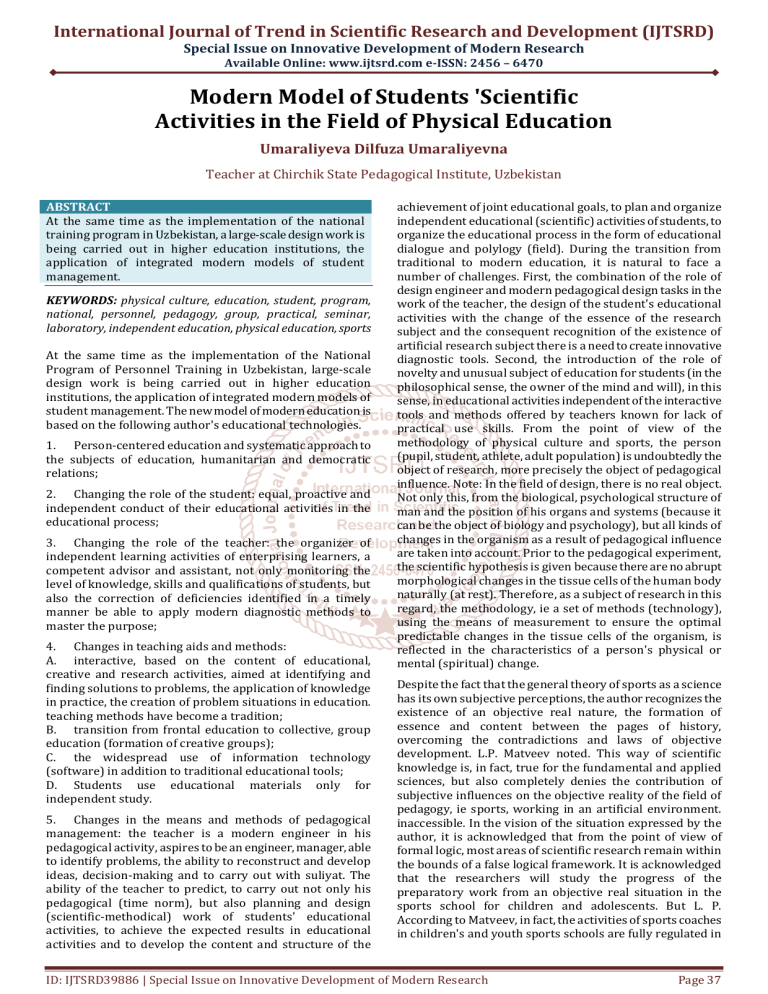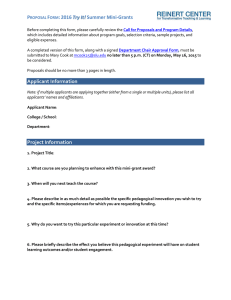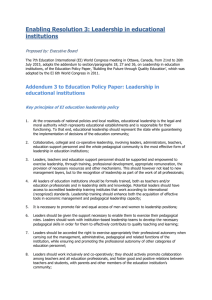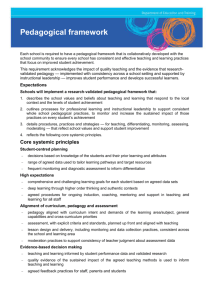
International Journal of Trend in Scientific Research and Development (IJTSRD) Special Issue on Innovative Development of Modern Research Available Online: www.ijtsrd.com e-ISSN: 2456 – 6470 Modern Model of Students 'Scientific Activities in the Field of Physical Education Umaraliyeva Dilfuza Umaraliyevna Teacher at Chirchik State Pedagogical Institute, Uzbekistan ABSTRACT At the same time as the implementation of the national training program in Uzbekistan, a large-scale design work is being carried out in higher education institutions, the application of integrated modern models of student management. KEYWORDS: physical culture, education, student, program, national, personnel, pedagogy, group, practical, seminar, laboratory, independent education, physical education, sports At the same time as the implementation of the National Program of Personnel Training in Uzbekistan, large-scale design work is being carried out in higher education institutions, the application of integrated modern models of student management. The new model of modern education is based on the following author's educational technologies. 1. Person-centered education and systematic approach to the subjects of education, humanitarian and democratic relations; 2. Changing the role of the student: equal, proactive and independent conduct of their educational activities in the educational process; 3. Changing the role of the teacher: the organizer of independent learning activities of enterprising learners, a competent advisor and assistant, not only monitoring the level of knowledge, skills and qualifications of students, but also the correction of deficiencies identified in a timely manner be able to apply modern diagnostic methods to master the purpose; 4. Changes in teaching aids and methods: A. interactive, based on the content of educational, creative and research activities, aimed at identifying and finding solutions to problems, the application of knowledge in practice, the creation of problem situations in education. teaching methods have become a tradition; B. transition from frontal education to collective, group education (formation of creative groups); C. the widespread use of information technology (software) in addition to traditional educational tools; D. Students use educational materials only for independent study. 5. Changes in the means and methods of pedagogical management: the teacher is a modern engineer in his pedagogical activity, aspires to be an engineer, manager, able to identify problems, the ability to reconstruct and develop ideas, decision-making and to carry out with suliyat. The ability of the teacher to predict, to carry out not only his pedagogical (time norm), but also planning and design (scientific-methodical) work of students' educational activities, to achieve the expected results in educational activities and to develop the content and structure of the achievement of joint educational goals, to plan and organize independent educational (scientific) activities of students, to organize the educational process in the form of educational dialogue and polylogy (field). During the transition from traditional to modern education, it is natural to face a number of challenges. First, the combination of the role of design engineer and modern pedagogical design tasks in the work of the teacher, the design of the student's educational activities with the change of the essence of the research subject and the consequent recognition of the existence of artificial research subject there is a need to create innovative diagnostic tools. Second, the introduction of the role of novelty and unusual subject of education for students (in the philosophical sense, the owner of the mind and will), in this sense, in educational activities independent of the interactive tools and methods offered by teachers known for lack of practical use skills. From the point of view of the methodology of physical culture and sports, the person (pupil, student, athlete, adult population) is undoubtedly the object of research, more precisely the object of pedagogical influence. Note: In the field of design, there is no real object. Not only this, from the biological, psychological structure of man and the position of his organs and systems (because it can be the object of biology and psychology), but all kinds of changes in the organism as a result of pedagogical influence are taken into account. Prior to the pedagogical experiment, the scientific hypothesis is given because there are no abrupt morphological changes in the tissue cells of the human body naturally (at rest). Therefore, as a subject of research in this regard, the methodology, ie a set of methods (technology), using the means of measurement to ensure the optimal predictable changes in the tissue cells of the organism, is reflected in the characteristics of a person's physical or mental (spiritual) change. Despite the fact that the general theory of sports as a science has its own subjective perceptions, the author recognizes the existence of an objective real nature, the formation of essence and content between the pages of history, overcoming the contradictions and laws of objective development. L.P. Matveev noted. This way of scientific knowledge is, in fact, true for the fundamental and applied sciences, but also completely denies the contribution of subjective influences on the objective reality of the field of pedagogy, ie sports, working in an artificial environment. inaccessible. In the vision of the situation expressed by the author, it is acknowledged that from the point of view of formal logic, most areas of scientific research remain within the bounds of a false logical framework. It is acknowledged that the researchers will study the progress of the preparatory work from an objective real situation in the sports school for children and adolescents. But L. P. According to Matveev, in fact, the activities of sports coaches in children's and youth sports schools are fully regulated in ID: IJTSRD39886 | Special Issue on Innovative Development of Modern Research Page 37 International Journal of Trend in Scientific Research and Development (IJTSRD) @ www.ijtsrd.com eISSN: 2456-6470 the textbook "Theory and Methods of Physical Education" on the basis of programs and regulations. This means that if the researcher concludes, it is in accordance with the general rules of the textbook, which confirms once again the validity of not only the researcher but also the general theory. In order to overcome the erroneous logical boundary, it is necessary to first acknowledge the existence of the fact of the subject of artificial examination in any existing pedagogical discipline. In this case, the methodology will change, that is, it will be necessary to recognize the need to move from scientific methodology to the methodology of artificial design of objects, processes, methodologies and technologies. Design can be understood in the sense of the development of project documents, including explanatory letters, tables, calculations explaining the operation of the artificial object in the natural and artificial environment and its structure. If we consider the emergence of something or a process that did not exist before as an innovation, it is impossible to create an innovative technology within the framework of traditional natural-scientific cognition methodology, because the objective real investigation before the occurrence of a new artificial object he was not there. From time immemorial, man has been able to know objective reality only subjectively, relying on his emotions, but for the first time in history, with the creation of measuring tools and techniques (techniques), his possibilities of objective cognition have expanded and further developed. Reaches the conditions of the modern model of education require the following general learning skills and competencies to be acquired in the first year. 1) independent activity of the student in lectures, practical and seminar classes: schematic, sequential recording of the main issues and conclusions in the independent performance of educational tasks (tasks); search, learn, understand, critically evaluate and retrieve data as needed; to present in the form of reports, abstracts, giving meaning in the language of signs and symbols; create a scientific authoring page in accordance with the pre-set requirements. 2) visual aids, information on the presentation of the completed assignment, scientific developments of the member of the scientific and creative circle (group) (essay, thesis, article, abstract, course work, graduation thesis, master's dissertation) acquisition of skills of free use of technological means; 3) communicative skills: the initiator of educational cooperation with teachers and other students, selfexpression, compromise, dialogue on the topic, addressing questions close to the essence of the issue, round (audience) active participation in compliance with the rules; 4) skills of cooperation: mutual analysis and mutual evaluation in solving common tasks, culture of cooperation, team planning (design) of cooperation activities for the implementation of educational tasks, readiness and ability to work in a team; 5) analysis of the problem situation in problem reports, finding creative solutions to educational tasks, development of ideas, independent, collective decision-making. Forms of research work with students in higher education institutions are carried out mainly in two directions: 1. Form of educational research work based on the curriculum of educational directions; 2. Forms of research work of students under the guidance of professors and teachers. This type of higher education activity is carried out within the framework of the compulsory educational process and covers all forms of the educational process: Block3 - general professional subjects, block 4 - specialty subjects, block 5 - writing essays on specific topics in the process of studying additional subjects; 2. Identify problems in the field of physical culture and sports in the process of practical, seminar, laboratory and independent learning, perform tasks and assignments that have elements of the search for solutions; 3. Execution of individual tasks of research, research nature during the period of different qualification practice; 4. Development of methodical materials (assignment sheets) related to the use of research methods (questionnaire, pedagogical observation, chronometric and pulsometric analysis, testing, pedagogical control, mathematical analysis); 5. Preparation and defense of term papers and dissertations related to the problems of research planned at the departments; During the academic year, students are required to master the tasks by gradually complicating and deepening the methods of scientific knowledge in the field of education in accordance with the STS, curricula and science programs of higher education. In the field of student research and development, Russian scientists have identified the following possible levels of self-development through the generalization of experimental data: 1. Reproductive-stereotype (problem solving is carried out according to the algorithm of pre-mastered thinking, activity and relations). Students turn to the teacher to better understand the research tasks, the algorithm of activity. They try to get results quickly with less time. They do not strive to develop a culture of teaching and research, especially personal qualities; 2. Adaptation (based on an algorithm developed in advance by the teacher, students perform research work. At this level, too, students' self-development, which has a personal value in teaching and research activities, the stability of aspirations, such as consciously engaging in activities, is not observed; 3. Creative-reflexive (students can understand the nature of the problem, model the research situation, options and solutions by updating their personal, valuable, creative potentials. Based on reflection, students can critically analyze the results of their creative achievements. They can identify and overcome barriers to intellectual, cultural and scientific development in general. During the second year, students will be able to individually determine the topic of research, as well as the work of scientific and creative circles of students, as well as the department of the faculty. will have a complete database of areas of professional activity. In the third year, students conduct independent research in accordance with the course work assignments (projects) prepared in advance by professors and teachers of nonabstract subjects. Most students' work in this category is abstract and in some cases can be practical. Ability to create the first innovative conditions in the field of physical education and sports on the basis of the first creative ID: IJTSRD39886 | Special Issue on Innovative Development of Modern Research Page 38 International Journal of Trend in Scientific Research and Development (IJTSRD) @ www.ijtsrd.com eISSN: 2456-6470 research, which combines the course work, theory and practice of science, performed by talented students. By the fourth academic year, the level of readiness of students is formed, which is sufficient to carry out both theoretical and practical course work in the specialty, to conduct independent research. Pedagogical practice, which is one of the requirements of the field of education, has a positive impact on the effectiveness of educational and research activities of students, the preparation and defense of graduate work brings them closer to the level of professional training. The introduction of individual research tasks into the educational process is one of the manifestations of innovative educational technology. Individual activities of students outside this type of classroom - have the characteristics of teaching, research or design, which are carried out during the development of program materials of the course, as well as forms of assessment of students' knowledge (final control, exam, test) ends with. Independent research of students in the system of higher education through the practical application of the acquired knowledge on the course, along with the study of some of the program materials, systematization, deepening, generalization, consolidation of knowledge; aimed at developing skills. Common among students' individual research tasks include: a syllabus according to the proposed plan (or independently developed) on a particular topic (module); abstract on a topic (module) or a narrow problem; compute on the topic (module) or compile practical tasks appropriate to different pedagogical situations, find solutions; events relevant to pedagogical situations, development of theoretical or practical functional model of processes; annotation, bibliographic description, retrospective research of additional literature indicated in the science program. Students' individual learning activities are assessed by a science teacher (lecturer). In the final session, students will be assessed after reviewing the content of their individual study activities (student's oral and written reports). Assessment of students' individual learning activities is taken into account in the final assessment of the subject, the weight of which can be from 30% to 50%, depending on the content and complexity of the task. In accordance with the curriculum of the field of study, it is important to prepare coursework and graduate work in the educational and research activities of students. The student takes the first independent step on the path of scientific research to complete the course work, learns to work with scientific literature, develops the skills of critical sorting and analysis of the necessary information on the topic. By increasing the requirements for writing course work from course to course, a real creative process environment is provided. Diploma work in higher education institutions is the final stage of education, which is aimed at in-depth study of the topic chosen by the graduate, strengthening and expanding theoretical knowledge. During the pedagogical practice, most students have a clear idea of the topics of their work, in addition to the analysis of the initial literature, the scientific value of the work is enriched on the basis of personal and practical experience. Abstracts on the topics of seminars and practical classes can also be used in the educational and research work of students, if several scientific articles (theses), based on sources. References: [1] Davydova L. N., Various approaches to determining the quality of education / L. N. Davydova // Quality. Innovations. Education. - 2005. - № 2. - p. 5-8. [2] Kadyrov R. H. Scientific research of physical culture and sports. - Bukhara.: Durdona Publishing House. 2018. - 251 b. [3] Khazova S. A., Bguashev A. B. ACTUAL PROBLEMS AND MODERN STATUS OF SCIENTIFIC RESEARCH IN THE FIELD OF PHYSICAL CULTURE AND SPORTS // Modern scientific technologies. - 2016. - № 12-3. - S. 637-6414 [4] Ishmuhamedov R., Abduqodirov A., Pardaev A. Innovative technologies in education (practical recommendations for pedagogical teachers of educational institutions). - T.: Iste'dod, 2008. - 180 p. ID: IJTSRD39886 | Special Issue on Innovative Development of Modern Research Page 39


